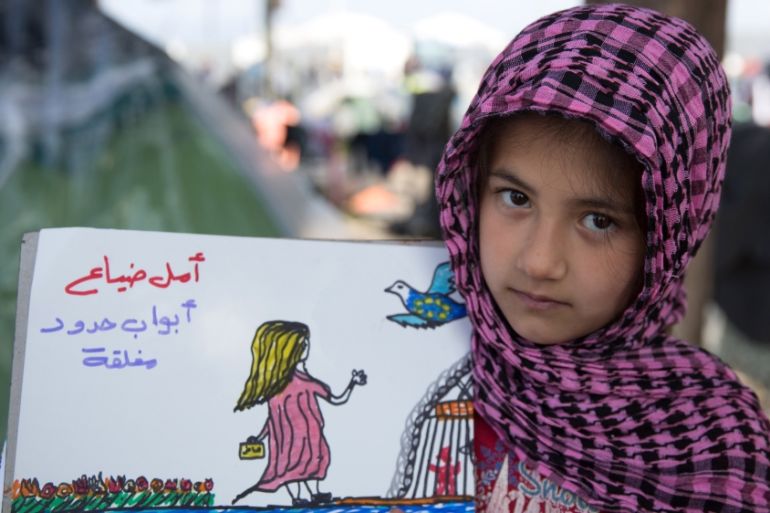Syria’s war: The hypocrisy of US-Russian cooperation
With no other military or political solution on offer, the Syrian conflict will nestle back into a disastrous stalemate.

What a difference a month can make. This week, US officials halted talks with Russia on a ceasefire in Syria they had agreed to in September, signalling the death of yet another plan to end the conflict.
With no other military or political initiative currently on offer, the conflict will nestle back into a disastrous stalemate. In the most optimistic interpretations of the ceasefire, enhanced US and Russian cooperation would eventually de-escalate the violence and lead to further measures to end the conflict.
Keep reading
list of 4 itemsBeyond borders: Migrants online
Tunis police raid sees refugees abandoned near the border with Algeria
‘No turning back’: Carnation Revolution divides Portugal again, 50 years on
Such optimism rested on the faulty assumption that the Americans and Russians were actually willing to cooperate to end the Syrian conflict and that they had a shared interest in doing so.
Any belief that the two countries’ interests could cohere and be expressed in a partnership on Syria has presumably been put to rest.
|
|
It is naive to believe that any future cooperative measures will be anything but cosmetic. The collapse of the ceasefire makes clear that the United States has neither the desire nor the political and military will to effect a change in Russia’s and, by extension, the Syrian regime’s strategy or goals in the conflict.
|
From the very beginning, the ceasefire was merely a cover and a means of providing US, and by extension international, support for the Russian strategy in Syria. |
Even after the ceasefire was declared, Russian and regime forces continued to target hospitals, civilian areas and aid convoys.
The strategy of decimating and suffocating existing rebel-held areas continued, this time under the cover of the ceasefire that legitimised the violence.
Faced with such blatant disregard for the spirit, if not the letter, of the ceasefire, US officials were left with no other option but to withhold cooperation. This is all well and good for Russia, which never seemed intent on altering their military strategy in the context of increased cooperation with the US.
From the very beginning, the ceasefire was merely a cover and a means of providing the US, and by extension international, support for the Russian strategy in Syria. The ceasefire was a relationship of the utmost convenience for both parties: The US could claim that it was doing something on the Syrian front and Russia would have an alibi for its military strategy in Syria.
The collapse of the ceasefire exposed the hypocrisy and shallowness of US-Russian cooperation. Immediately, Russia moved more anti-defence missiles into Syria in an implicit declaration that cooperation was over. US officials have been left to issue hollow threats that they may begin to attack regime targets, especially runways, to halt the aerial attacks.
It is not hard to see which move to take more seriously. What is serious, however, is that any cooperation will be impossible in the foreseeable future. The two countries will merely resume their cat-and-mouse game in Syria.
Where does this leave Syria today? The conflict is no closer to a resolution of the military and political stalemate than it was before the ceasefire. The US will continue its bombardment of areas under the control of the Islamic State of Iraq and the Levant (ISIL, also known as ISIS), while feigning interest in a multilateral process to end the Syrian conflict.
Such has been the US approach for years now. The rest of the world will propose meaningless solutions that do not reflect the realities on the ground. UN envoys may come and go. Yet another recalibration of regional strategies will occur to account for the collapsed ceasefire.
|
|
All of these changes will signal minor shifts but will ultimately perpetuate the current stalemate.
And while this happens, the Russian and Syrian regime strategy will be pursued to its logical end. There is no reason to believe that any military or political process will emerge to prevent the pursuit of this strategy.
Until it is realised, the military and political stalemate will continue with no end in sight.
A harsh and saddening reality emerges: There is no productive solution on the horizon to end the Syrian conflict. All parties to the conflict continue to pursue competing military strategies to establish the basis for imposing a political solution.
No party is interested in process at this point, and so we are back to square one, right where we were before the ceasefire. The status quo has been catastrophic for millions of people and, unfortunately, it is that same status quo that all parties to the conflict are perpetuating, whether through their indifference or their engagement.
Samer Abboud is an associate professor of historical and political studies at Arcadia University and author of Syria, on Syria’s descent into civil war.